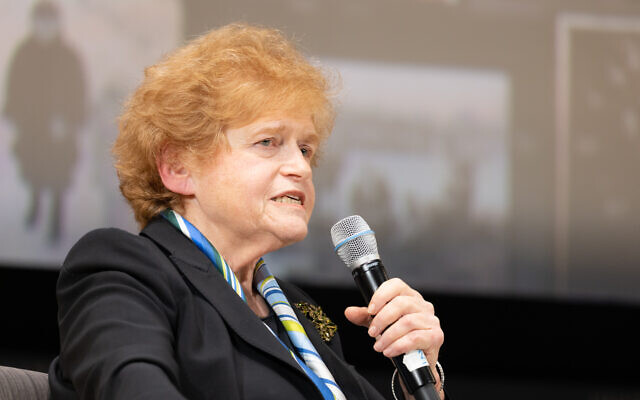Lipstadt Gives First Address as Special Envoy
In her first public event as U.S. Special Envoy to Monitor and Combat Antisemitism, Ambassador Deborah E. Lipstadt was welcomed by Museum Chairman Stuart E. Eizenstat.
Dave Schechter is a veteran journalist whose career includes writing and producing reports from Israel and elsewhere in the Middle East.
There was a certain symmetry to the U.S. Holocaust Memorial Museum in Washington, D.C., hosting Professor — now Ambassador — Deborah Lipstadt’s first address as the United States special envoy to combat and monitor antisemitism.
Lipstadt was a consultant during planning for the USHMM and later served on its governing council. She was introduced — as “the right person at the right time” — by Atlanta native and Museum Chairman Stuart Eizenstat. In 1978, as senior domestic policy adviser to President Jimmy Carter, Eizenstat played a significant role in the formation of the commission that conceived the museum, visited by more than 47 million people since opening in 1993.
Lipstadt was confirmed by the Senate on a voice vote on March 30, eight months after her nomination by President Joe Biden and delays forced by Republican senators irritated by her social media posts. The vote was called by Sen. Jon Ossoff, the first Jewish senator from the state of Georgia.
Lipstadt delivered an overview of antisemitism not dissimilar from those she has given on other occasions. Now, though, as a representative of the U.S. government, her words carry a different weight than when she was the Dorot Professor of Modern Jewish and Holocaust Studies at Emory University, from which she is on leave.

Lipstadt began with a lengthy satirical joke that she had been told in Moscow in 1972, on Rosh Hashanah, by two refuseniks — Soviet Jews who had been denied permission to immigrate to Israel. Shortly thereafter, she addressed today’s Russia and its invasion of Ukraine, a former Soviet republic.
Lipstadt declared herself “stupefied and, more importantly, outraged by the exploitation” of the Holocaust for what she called “a coldblooded war of choice.” As examples of “egregious Holocaust distortion” she referenced Russian President Vladimir Putin asserting that his country is fighting Nazis in Ukraine and Russian Foreign Minister Sergei Lavrov claiming that Nazi leader Adolph Hitler had “Jewish blood.”
Such “soft core” Holocaust denial is “the rewriting of the facts to serve other ends … turning the victim into victimizer, or the perpetrator into a victim,” she said.
Speaking of the world more broadly, Lipstadt said, “Antisemitism does not come from one end of the political spectrum. It is ubiquitous and is espoused by people who agree on nothing else or, better put, disagree on everything else.”
“Too many people, organizations and institutions do not take antisemitism seriously,” she said, and too often “those who condemn it cannot bring themselves to focus specifically on this particular prejudice.”

During a question-and-answer session with Sara Bloomfield, the museum’s director, Lipstadt framed the issue in more dire terms: “Some people still have a hard time taking it seriously, unless Jews die.”
In her speech, Lipstadt said that the U.S. government affirms that “criticism of Israeli policies is not antisemitism,” but when there is an “imbalance” in such criticism, an unwillingness “to see the wrong of others … one is compelled to ask, what’s the basis for this imbalance?”
Lipstadt gave a verbal nod to the presence of her predecessor, Elon Carr, who served as the special envoy under former President Donald Trump, and to the Abraham Accords, agreements reached during the Trump presidency that expanded relations between Israel and Bahrain, Morocco and the United Arab Emirates. The accords are “an important initial step in normalization of relations” between Israel and its Arab Muslim neighbors, she said, adding that the task now is to “forge partnership with those and other countries in the Middle East and to foster interfaith dialogue.”
Speaking of the rise of antisemitism in Europe and in parts of Latin America, Lipstadt said, “Jew-hatred, antisemitism, is a threat to the stability of all governments. No government thrives when it harbors deep-seated antisemitism.”
Though, by statute, Lipstadt’s portfolio is antisemitism outside of the United States, she said it cannot be divorced from events in this country, noting that the man who held a rabbi and three worshippers hostage in a Texas synagogue in January was a British national who had been radicalized before coming to the U.S.
“I resolve to fight this plague with every fiber of my being,” Lipstadt said.
A member of Congregation Ohr HaTorah in Toco Hills, Lipstadt said that when she took her oath of office, she made certain that the phrase “so help me God” was included. “With the task facing me, I needed every bit of support I could muster.”
- News
- World
- Dave Schechter
- U.S. Holocaust Memorial Museum
- Deborah Lipstadt
- Museum Chairman Stuart Eizenstat
- President Jimmy Carter
- President Joe Biden
- Sen. Jon Ossoff
- Dorot Professor of Modern Jewish and Holocaust Studies at Emory Universit
- Antisemitism
- Rosh Hashana
- rosh hashanah
- Russian Jews
- Elon Carr
- Donald Trump
- Congregation Ohr HaTorah
- toco hills




comments